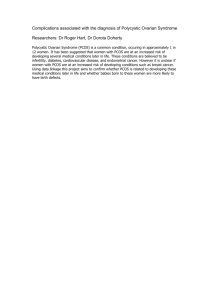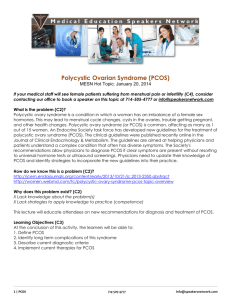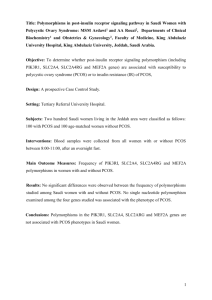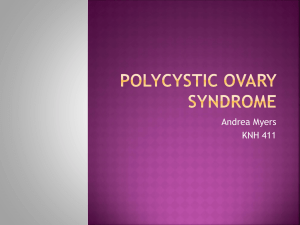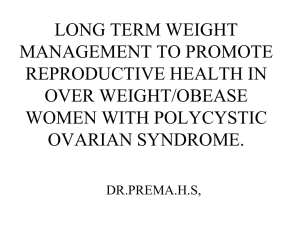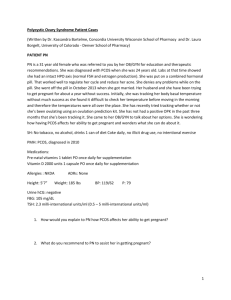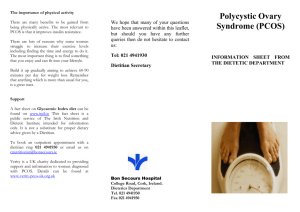PCOS - fact sheet
advertisement
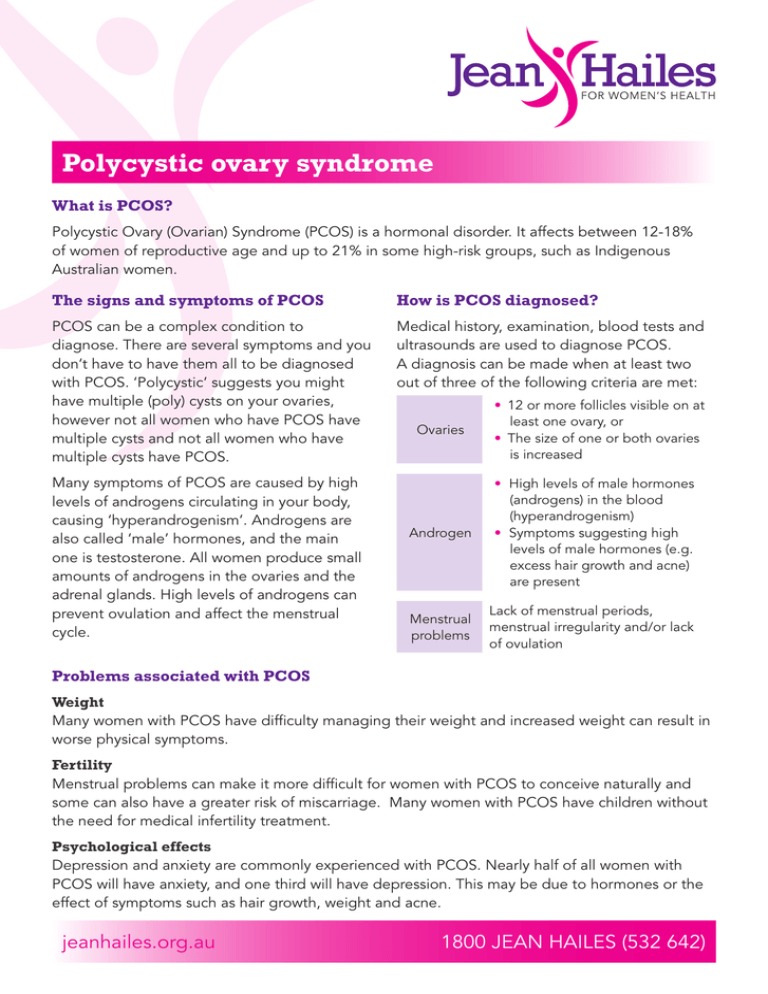
Polycystic ovary syndrome What is PCOS? Polycystic Ovary (Ovarian) Syndrome (PCOS) is a hormonal disorder. It affects between 12-18% of women of reproductive age and up to 21% in some high-risk groups, such as Indigenous Australian women. The signs and symptoms of PCOS How is PCOS diagnosed? PCOS can be a complex condition to diagnose. There are several symptoms and you don’t have to have them all to be diagnosed with PCOS. ‘Polycystic’ suggests you might have multiple (poly) cysts on your ovaries, however not all women who have PCOS have multiple cysts and not all women who have multiple cysts have PCOS. Medical history, examination, blood tests and ultrasounds are used to diagnose PCOS. A diagnosis can be made when at least two out of three of the following criteria are met: Many symptoms of PCOS are caused by high levels of androgens circulating in your body, causing ‘hyperandrogenism’. Androgens are also called ‘male’ hormones, and the main one is testosterone. All women produce small amounts of androgens in the ovaries and the adrenal glands. High levels of androgens can prevent ovulation and affect the menstrual cycle. Ovaries • 12 or more follicles visible on at least one ovary, or • The size of one or both ovaries is increased Androgen • High levels of male hormones (androgens) in the blood (hyperandrogenism) • Symptoms suggesting high levels of male hormones (e.g. excess hair growth and acne) are present Menstrual problems Lack of menstrual periods, menstrual irregularity and/or lack of ovulation Problems associated with PCOS Weight Many women with PCOS have difficulty managing their weight and increased weight can result in worse physical symptoms. Fertility Menstrual problems can make it more difficult for women with PCOS to conceive naturally and some can also have a greater risk of miscarriage. Many women with PCOS have children without the need for medical infertility treatment. Psychological effects Depression and anxiety are commonly experienced with PCOS. Nearly half of all women with PCOS will have anxiety, and one third will have depression. This may be due to hormones or the effect of symptoms such as hair growth, weight and acne. jeanhailes.org.au 1800 JEAN HAILES (532 642) Other health problems linked to PCOS There is an increased risk of developing a number of complications with PCOS including insulin resistance (your body doesn’t use the available insulin effectively to help keep the glucose levels stable), prediabetes, type 2 diabetes, cholesterol and blood fat abnormalities, and cardiovascular disease (heart disease, heart attacks, stroke). Managing and treating PCOS A healthy lifestyle is the first step in managing PCOS. Depending on the symptom, other ways may include: Symptom Ways to manage the symptom Hormonal contraception such as: Irregular periods Excess hair Acne Fertility Depression & anxiety • low-dose oral contraceptive pill • progesterone (stimulates the uterus and induces bleeding) • hormonal implants • vaginal contraceptive rings • intra-uterine devices containing progesterone • insulin sensitising medications such as Metformin • Waxing, laser hair removal, electrolysis • Reduction in the amount of androgens in the body using: – hormonal contraception – anti-androgen drugs e.g. cyproteone acetate – insulin sensitising medications such as metformin • Topical preparations (creams) • Antibiotics • Reducing amount of androgens in the body using: – hormonal contraception – anti-androgen drugs e.g. cyproteone acetate • Insulin sensitising medications such as Metformin • Isotretinoin (sold as Roaccutane) • Weight management: losing 5-10% of body weight can help to induce ovulation • Monitoring ovulation (e.g. using ovulation predictor kits) • Ovulation induction using medications such as clomiphene citrate, metformin, gonadotropins, aromatase inhibitors If you experience extreme feelings and thoughts of fear, sadness, or have lost interest in your usual activities, it’s important to discuss your mood with your doctor. Treatments are available, including talk therapy and some medications. For more information go to jeanhailes.org.au/health-a-z/pcos Polycystic ovary syndrome fact sheet - Updated April 2014 This fact sheet is designed to be informative and educational. It is not intended to provide specific medical advice or replace advice from your medical practitioner. Jean Hailes for Women’s Health gratefully acknowledges the support of the Australian Government.
